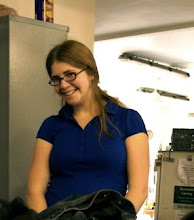
The transition to Yom Ha'atzmaut from the mourning of Yom HaZikaron was quick. I wasn't sure exactly what intention I wanted to take into Yom Ha'atzmaut with me. As my friend Alanna said, my lefty political values and my Zionism don't need to contradict each other. We went to a טקס(tekes=ceremony) sponsored by Yesh G'vul, designed to be an alternative to the state-sponsored ceremony at Har Herzl. It was definitely a snapshot of the Israeli left; there were more people than I expected to see, and a diverse group with respect to age - I even ran into an old friend, Idan, with whom I had worked 3 summers ago. I was disappointed by the ceremony itself. I thought it was boring and dry; I was looking to have my lefty neshama moved and stirred up by the hard work being done by the social change workers they chose to honor with beacon lighting.
The one moment that did give me some of those chills was when all of the children present were invited to come up and light the final beacon. I think, for me, that is the intention, the kavannah for Yom Ha'atzmaut: a lot of good has been done in this country in the past 62 years, along with a lot that should not be repeated in its next 62 years. But Israel and Israelis will keep working to build a just, peaceful, and safe society for the next generation of children to grow up in.






that's beautiful. I like your closing thoughts a lot. Thanks for sharing :)
ReplyDelete